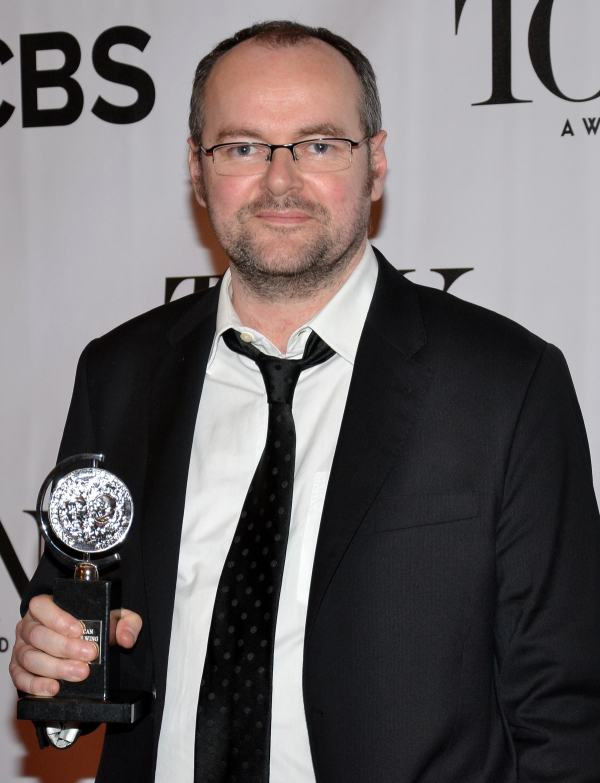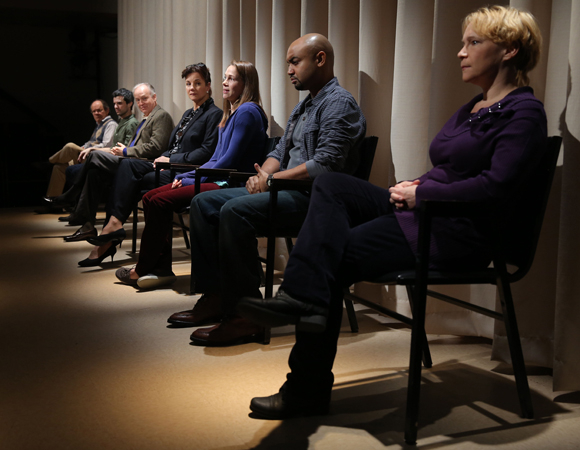2013 Tony Award Winner Dennis Kelly Is Taking Care of Baby Off-Broadway
The British playwright and ”Matilda The Musical” scribe discusses his new play at Manhattan Theatre Club.
British playwright Dennis Kelly was relatively unknown to American audiences when he made his Broadway debut in April, as book writer of Matilda The Musical. Cut to June, when his smart, sharp adaptation of Roald Dahl’s novel won him a Tony Award, one of three for the show, which is still playing to packed crowds at the Shubert Theatre.

(© David Gordon)
This fall, Kelly has traded the massive, three-tiered house for a significantly more intimate space, Manhattan Theatre Club’s Studio at Stage II, where his 2007 drama Taking Care of Baby currently runs through December 8. In the work, Kelly challenges verbatim theater (where plays about an event or topic are constructed from the words of actual people) to tell the (not real) story of a young mother who is imprisoned for the murder of her children.
TheaterMania chatted with Kelly about why this form was worth exploring, how it feels to be a new Tony Award winner, and whether or not Matilda is about to become a movie.
What made you write Taking Care of Baby?
I wanted to write about truth. There’s a feeling that if you can mathematically prove something is true, then it is. That often happens in our media and in politics. If you can mathematically prove it’s true, it doesn’t matter if it is. Strangely, I felt the best way of writing about truth was to lie. I don’t know what was going on there.
Is verbatim theater a form you appreciate, or is this play a criticism of it?
I really like verbatim theater. The play was seen as a critique of verbatim theater, which I was upset by. It wasn’t, really. We have things that tell you they’re telling the truth. In theater, it’s verbatim theater. In movies, you have blockbuster documentaries. In books you have memoirs. And reality TV. There’s a phenomenon in culture. I thought I would use the theatrical version. The danger is that the more people say “I’m telling you the truth,” oddly, the less you believe them.
How involved were you with MTC’s production?
I was a bit involved; not a huge amount, to be honest. I was there for the first couple days of rehearsal. I was involved with meeting [director] Erica Schmidt. She seemed to have a really great take on the play. I did feel very comfortable leaving it with her. She understood it completely.
The original script is set in the U.K. Why choose to Americanize for the New York staging?
I kind of preferred that we Americanize it. I had to have help, obviously — I don’t really know America enough to Americanize it. Erica and Mandy Greenfield were quite key [in the Americanization]. It was a good idea. It’s nice when plays happen here, rather than happening far off, somewhere else. They felt like it was right to adapt.
Does a play like this resonate more with American audiences because of, say, Casey Anthony’s murder trial? Was that as much of a media sensation in the U.K. as it was here?
No, I don’t know that case at all. When I was writing, there were a number of cases in the U.K. where women had been wrongfully imprisoned for cot deaths, and proved to be [not guilty] and released. I didn’t base it on any of these cases. It seemed to me that these women were innocent. I remember talking to some students about it in Frankfurt. I’ve always maintained that whenever I’m asked, “Did she do this?,” I say, “I don’t know.” I did the play like a verbatim play, so I interviewed the characters, except [they] were in my head. When I talked to students in Frankfurt, they said, “Yeah, of course [she did it],” which was very depressing for me. There is something in me that wants to think [that it’s] because people were so appalled of the idea of someone murdering their children.
Switching gears, has it sunk in yet that you’re a Tony Award winner for Matilda?
[laughs] Yeah, I guess so. It was amazing, really. It was nice to get a Tony. It’s a funny thing. I always try to stay away from awards, emotionally. Because I could get dragged in quite a lot. I don’t know what it means, actually, to be a Tony winner. That’s a really hard question. [laughs]
Is it true you’re working on a musicalized film version, as some of the U.K. papers have reported?
Apparently. [laughs] I don’t know. As far as I know there are talks about the film, but it’s way off. No contracts have been signed. We’re all talking about the film version. It would be fantastic to do it. Or at least try. It’s always hard to see if you can make it jump on a film, isn’t it?

(© Joan Marcus)











